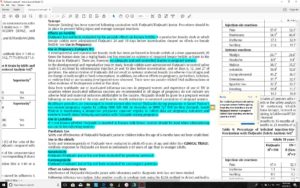We don’t know who replied, but there is a beautiful soul working in the dead letter office
Our 14-year-old dog Abbey died last month.
The day after she passed away my 4-year-old daughter Meredith was crying and talking about how much she missed Abbey.
She asked if we could write a letter to God so that when Abbey got to heaven, God would recognize her.
I told her that I thought we could so, and she dictated these words:
Dear God,
Will you please take care of my dog?
She died yesterday and is with you in heaven.
I miss her very much.
I ‘m happy that you let me have her as my dog even though she got sick.
I hope you will play with her.
She likes to swim and play with balls.
I am sending a picture of her so when you see her you will know that she is my dog.
I really miss her.
Love, Meredith
We put the letter in an envelope with a picture of Abbey & Meredith , addressed it to God/Heaven.
We put our return address on it.
Meredith pasted several stamps on the front of the envelope because she said it would take lots of stamps to get the letter all the way to heaven. That afternoon she dropped it into the letter box at the post office.
A few days later, she asked if God had gotten the letter yet.
I told her that I thought He had.
Yesterday, there was a package wrapped in gold paper on our front porch addressed, ‘To Meredith’ in an unfamiliar hand.
Meredith opened it.
Inside was a book by Mr. Rogers called, ‘When a Pet Dies.’
Taped to the inside front cover was the letter we had written to God in its opened envelope.
On the opposite page was the picture of Abbey & Meredith and this note:
Dear Meredith,
Abbey arrived safely in heaven. Having the picture was a big help and I recognized her right away.
Abbey isn’t sick anymore.
Her spirit is here with me just like it stays in your heart.
Abbey loved being your dog.
Since we don’t need our bodies in heaven, I don’t have any pockets to keep your picture in so I’m sending it back to you in this little book for you to keep and have something to remember Abbey by.
Thank you for the beautiful letter and thank your mother for helping you write it and sending it to me.
What a wonderful mother you have.
I picked her especially for you.
I send my blessings every day and remember that I love you very much.
By the way, I’m easy to find.
I am wherever there is love.
Love,
God
We Created Value For Shareholders
The Himba Tribal Custom

Of all the African tribes still alive today, the Himba tribe is one of the few that counts the birth date of the children not from the day they are born nor conceived but the day the mother decides to have the child.
When a Himba woman decides to have a child, she goes off and sits under a tree, by herself, and she listens until she can hear the song of the child who wants to come. And after she’s heard the song of this child, she comes back to the man who will be the child’s father, and teaches him the song. When they make love to physically conceive the child, they sing the song of the child as a way of inviting the child.
When she becomes pregnant, the mother teaches that child’s song to the midwives and the old women of the village, so that when the child is born, the old women and the people gather around him/her and sing the child’s song to welcome him/her. As the child grows up, the other villagers are taught the child’s song. If the child falls, or gets hurt, someone picks him/her up and sings to him/her his/her song. Or maybe when the child does something wonderful, or goes through the rites of puberty, then as a way of honoring this person, the people of the village sing his or her song.
In the Himba tribe there is one other occasion when the “child song” is sang to the Himba tribesperson. If a Himba tribesman or tribeswoman commits a crime or something that is against the Himba social norms, the villagers call him or her into the center of the village and the community forms a circle around him/her. Then they sing his/her birth song to him/her.
The Himba views correction not as a punishment, but as love and remembrance of identity. For when you recognise your own song, you have no desire or need to do anything that would hurt another.
In marriage, the songs are sung, together. And finally, when the Himba tribesman/tribeswoman is lying in his/her bed, ready to die, all the villagers that know his or her song come and sing – for the last time that person’s song.
Good Versus Great Mums
The accounting trick you’ve probably overlooked

It’s surprisingly simple, yet accountants suggest not enough business owners do it – often causing undue stress and difficulties down the track for business owners.
https://www.mybusiness.com.au/sales/2572-the-accounting-trick-you-ve-probably-overlooked
Fork More Powerful Than Pill Bottle
Safeguard and protect our environment!

Every politician should have the feet held to the fire of accountability on this one! Fracking, mining farmlands for coal, allowing depleted uranium munitions to be used during war games, clear cut fellling of old growth forests and littering our upper atmosphere with satellite junk are all crimes against the environment and treason to the people.
If My Speech Ends When Someone Gets Offended, How Do I Have Free Speech
RULES FOR SONS

1. Never shake a man’s hand sitting down.
2. Don’t enter a pool by the stairs.
3. The man at the BBQ Grill is the closest thing to a king.
4. In a negotiation, never make the first offer.
5. Request the late check-out.
6. When entrusted with a secret, keep it.
7. Hold your heroes to a higher standard.
8. Return a borrowed car with a full tank of gas.
9. Play with passion or not at all…
10. When shaking hands, grip firmly and look them in the eye.
11. Don’t let a wishbone grow where a backbone should be.
12. If you need music on the beach, you’re missing the point.
13. Carry two handkerchiefs. The one in your back pocket is for you. The one in your breast pocket is for her.
14. You marry the girl, you marry her family.
15. Be like a duck. Remain calm on the surface and paddle like crazy underneath.
16. Experience the serenity of traveling alone.
17. Never be afraid to ask out the best looking girl in the room.
18. Never turn down a breath mint.
19. A sport coat is worth 1000 words.
20. Try writing your own eulogy. Never stop revising.
21. Thank a veteran. Then make it up to him.
22. Eat lunch with the new kid.
23. After writing an angry email, read it carefully. Then delete it.
24. Ask your mom to play. She won’t let you win.
25. Manners maketh the man.
26. Give credit. Take the blame.
27. Stand up to Bullies. Protect those bullied.
28. Write down your dreams.
29. Always protect your siblings (and teammates).
30. Be confident and humble at the same time.
31. Call and visit your parents often. They miss you.
Read This Before You Get A Flu Shot

This year in Australia, FluQuadri will be widely administered to pregnant women. Having finally received the vaccine insert from Sanofi by email (reluctantly after repeated requests), I needed to share a very important fact. Flu vaccinations have never been tested for use in pregnant women….this I already knew. What I didn’t know is that it is clearly stated in the vaccine inserts that pregnant women being administered the flu vaccine are taking part in a trial.
Although our government (Greg Hunt in particular) and the media promote flu vaccines as safe and are recommended for use in pregnant women because the science is clear, what they are in actual fact doing is conducting a trial, but just not telling you or I about it. The insert asks pregnant women who have had the vaccine to register with the manufacturer so that they can be monitored post vaccination to see if there are any adverse effects upon a fetus. The data is then being collected and studied.
“Effects on Fertility – FluQuadri has not been evaluated for the possible effects on human fertility…there are no adequate and well-controlled studies in pregnant women… Healthcare providers are encouraged to enrol women who receive FluQuadri during pregnancy in Sanofi Pasteur’s vaccination pregnancy registry by calling 1800 829 468 (in Australia) or 0800 727 838 (in New Zealand). Sanofi Pasteur is maintaining a prospective pregnancy exposure registry to collect data on pregnancy outcomes and newborn health status following vaccination with FluQuadri during pregnancy”.
Wake up Australia!




